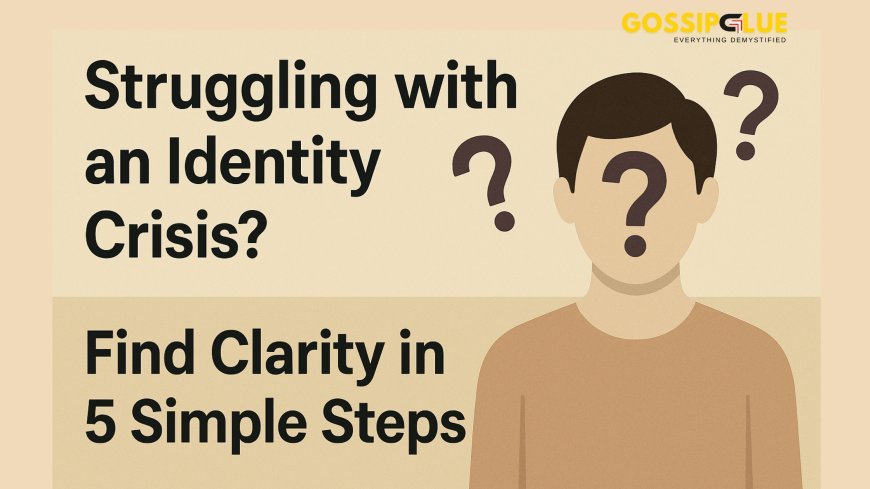Breaking Down the Identity Crisis: Psychology, Causes, and Examples
Explore the psychology behind identity crises, real-world examples, and practical tips for self-discovery during life transitions. Regain your true self. Today.

Imagine waking up one Monday morning, coffee in hand, scrolling through your code repository and suddenly wondering, Who am I beyond these tickets and pull requests? Ive been there. In my first IT role, I hit a point where my job title felt like a costume I no longer fit. That creeping sense of doubt and confusion? Thats the seed of an identity crisis. Today, well break down whats happening in your mind, why it happens especially during big life transitions and share real-world examples so you know youre not alone. By the end, youll have a roadmap toward self-discovery and confidence, even when everything feels uncertain.
What Is an Identity Crisis? Psychology Behind the Term
When we talk about identity crisis meaning, were referring to a period of deep self-questioning. Psychologist Erik Erikson coined the term in his work on human development, describing it as a crossroads where you ask, Who am I really? Its more than a midlife clich; it can happen at any age, especially during a major life transition be it starting a new job, moving cities, or finishing school. During this phase, you may wrestle with identity issues like feeling disconnected from your past goals, values, or even relationships.
Common Causes: Life Transitions and Loss of Identity
One of the biggest triggers for an identity crisis is a major life transition. Think landing a leadership role, relocating for work, or surviving a company layoff. Suddenly, your familiar routines vanish and you face a loss of identity youre no longer the junior developer or the team player you once were. Other causes include:
Career shifts: Moving from hands-on coding to management can leave you asking, Is this still me?
Personal upheaval: Breakups, health scares, or family changes can shake your sense of self.
Cultural or social changes: Joining a new community or returning to a hometown after years away.
These moments of disruption force a reckoning: without the old labels, who will you choose to be?
Identity Issues in the Tech World: Why IT Pros Are Vulnerable
In technology, our roles evolve faster than most fields. One month youre optimizing databases; the next youre learning AI frameworks. That constant pivot can spark self-doubt: Am I still an expert, or just a generalist who knows a little about everything? Impostor syndrome often tags along, whispering that youll be exposed as a fraud. And when your worth feels tied to the size of your backlog of pull requests, taking a break even a short vacation can feel like losing yourself. Recognizing these unique industry pressures is the first step toward tackling them head-on.
Real Identity Crisis Examples: Stories of Self-Discovery
1. The Mid-Career Manager: After five years leading a team, Ananya realized she missed writing code more than she enjoyed meetings. Her identity crisis example involved revisiting her core passion: building software. She negotiated a split role, reclaiming hands-on dev work alongside leadership duties.
2. The Remote Work Rookie: Rajesh moved to a fully remote setup and felt invisible no watercooler chatter, no spontaneous whiteboard sessions. His loss of identity came from missing daily interactions. He formed a virtual community of peers, hosting weekly hack nights that reignited his sense of belonging.
3. The New Graduate: Priya left university feeling she should have all the answers. When her first project didnt go smoothly, she panicked: What is an identity crisis if not this? Through mentorship and small wins, she learned that growth often looks like fumbling forward.
How to Navigate Your Own Crisis: Practical Tips for Self-Discovery
Journal your story: Write down moments when you felt most you. What tasks lit you up? What values guided your choices? This practice of self-reflection fuels lasting self-discovery.
Seek a mentor or coach: Talking through your identity issues with an experienced professional can help you spot blind spots and hidden strengths.
Set micro-goals: In a life transition, big objectives can feel overwhelming. Instead, aim for small, daily wins like mastering a new tool or speaking up in one meeting. Over time, these add up to renewed confidence.
Experiment boldly: Treat this phase as a sandbox. Try a side project outside your comfort zone perhaps open-source contributions or a non-technical hobby. Every experiment teaches you more about who you want to be.
Conclusion: Embrace the Journey, Not Just the Destination
An identity crisis isnt a sign of failure; its an invitation to grow. By understanding the psychology behind it, recognizing common causes, and learning from real identity crisis examples, you can turn confusion into clarity. Remember: self-discovery is a process, not a one-time event. So next time you wonder, Who am I? smile. Youre exactly where you need to be to find the answer.






























